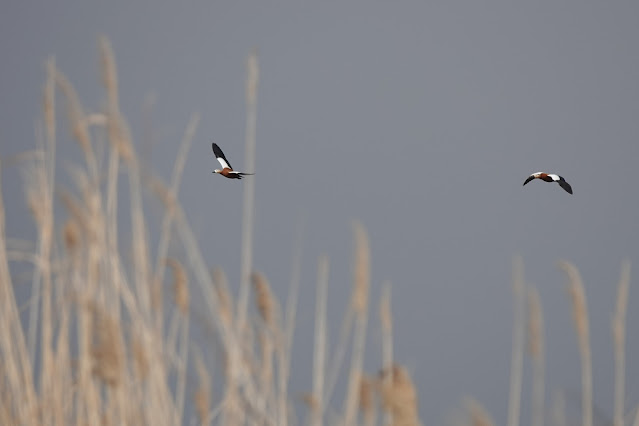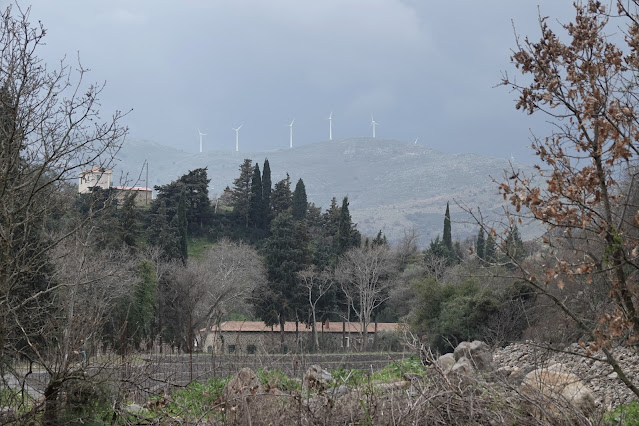A noticeably cooler day and the clouds were visibly scudding
across the landscape as we headed west from Anaxos following the coast to
Skoutaros and then to Skalachori with several roadside stops between the latter
two villages to listen and scan the green fields with their denuded Oak trees.
 |
| Outskirts of Skalachouri |
 |
| Being Sheep-bogged again |
It felt more Welsh than Lesvos but my walks up and down the roads gave clues to
where I really was. There were plenty of finches and I was taken aback by the
sound of a couple of Siskins going over. These were not even on my radar for
the trip (nb #9). Mistle Thrushes sang and Song Thrushes exploded from the
trees. There were Robins ticking all around and the odd Wren and another
Dunnock but a couple of Black Redstarts, singing Cirl Buntings and three Middle
Spotted Woodpeckers told me that I was still on the island. I found another
pair of Wood Nuthatch and was struck, not for the first time that the song and
calls are not quite the same pitch as those in western Europe.
 |
| Middle Spotted Woodpecker |
I followed the road to Kalo Limni, stopping to have a listen
on the way down. It often felt like the hillsides were quiet but in fact they
were alive with birds and I picked up Rock Nuthatches, Black Redstarts,
Stonechats, finches, Cirl Buntings and Sardinian Warblers before turning onto
the track to Ancient Antissa.
 |
| Black Redstart |
 |
| Western Rock Nuthatch |
 |
| To Ancient Antissa in the distance |
A similar suite of birds were encountered but
there were little parties of Meadow Pipit and Greenfinch along the open
sections and a male Blue Rock Thrush posed very nicely on a rocky pinnacle not
far from where one was in September.
 |
| Blue Rock Thrush - Andrea Vaughan |
Grape Hyacinths were flowering in the rock
verges and the Giant Fennel was putting on some serious heft to allow it to
push up to 3m and beyond.
 |
| Giant Fennel |
 |
| Grape Hyacinth |
 |
| Oxalis pes-caprae |
A little gully down to the sea was a sun and insect trap and
Chiffchaffs, Black Redstarts, Robins and a pair of Sombre Tits were avidly
feeding. The river had been scoured by heavy flooding at some stage during the
winter but still had plenty of water but only two noisy Ruddy Shelduck, a
single Great White Egret and Green Sandpiper were using it. I walked up and down
in the increasingly windy conditions hoping the rain would hold off and found a
field with 17 Skylarks and a separate flock of five Woodlarks grovelling
around. Goldfinches and Chaffinches were ever present and up above nine House
Martins became my first hirundines of the year.
 |
| Anchusa undulata |
 |
| Greenfinch |
 |
| Henbit Dead-nettle - Lamium amplexicaule |
 |
| House Martin |
 |
| Ruddy Shelduck |
 |
| Scilla hyacinthoides ? |
 |
| Yellow-legged Gulls |
 |
| Anthemis chia |
Ninety-nine Jackdaws whooshed through in one flock and some
Hooded Crows, Ravens and two small dogs were fussing over a sheep carcass while
a couple of Common Buzzards looked on. I did see a stunningly good Steppe
Buzzard candidate with wholly chocolate underparts and head. The bird was
particularly striking in flight where it looked almost black and white – I epically
failed to get any pictures!
 |
| Jackdaws |
On again with the first spots appearing on the windscreen
and I only stopped once before the main road to Gavathas to look at the
Virginia Stocks cascading down the cliffs.
 |
| One flowered Clover -Trifolium uniflorum |
 |
| Virginia Stocks |
 |
| Virginia Stocks |
 |
| Aeonium sp |
Perivolis Monastery was the last stop and lunch too, for us
and the new kittens that were unsurprisingly present. Just like September the
birding was superb with a pair of Wood Nuthatches poking around one of the
Oriental Planes, Hawfinch calling and another pair of Siskins. The male was
even singing but at least I got a pic of the female high up feeding on Plane
seeds.
 |
| Siskin |
 |
| Wood Nuthatch |
Grey and White Wagtails were along the river and a Kingfisher called as
it went through and Black Redstarts flicked across the boulders. Downriver a
Black Stork was fishing before having a good fly round and getting mobbed by
both Long-legged and Common Buzzards.
 |
| Black Stork and Long-legged Buzzard |
 |
| Atmospheric Black Stork |
Four more Mistle Thrush rattled and Song Thrushes erupted from the Olives as I walked down the river and a party of Long-tailed Tits moved through. At this point my brain said ‘oh Firecrest singing’ and then remembered that was I not at home but on Lesvos. It sang its heart out in the tall cypress trees and I saw that flashing supercilium a couple of times but I could get no closer. I was unaware that some winter here (nb #10) and the Collins map will need to be moved a little to encompass the island in pale blue for the next edition! |
| Mistle Thrush |
The spring bulbs pushing through along the track were superb
with a carpet of white Ornithogalum, tiny purple Sand Crocuses and two species
of yellow Gagea and dotted amongst them were the scarlet Anemones.
Wondrous.
 |
| Ornithogalum pedicellare |
 |
| Ornithogalum pedicellare |
 |
| Ornithogalum pedicellare |
 |
| Ornithogalum pedicellare |
 |
| Sand Crocus - Romulea ramiflora |
 |
| Gagea fitulosa |
 |
| Gagea penduncularis |
 |
| Wild Clary - Salvia verbenaca |
 |
| Ranunculus ficaria ficariiformis - flowers about 5cm across! |
 |
| Joint-Pine |
 |
| Cyclamen graecum and Umbilicus rupestris |
 |
| Rusty Backed Fern - Ceterach officinarum |
A Painted Lady glided by and a Seven Spot Ladybird was on the prowl.
 |
| Seven Spot Ladybird |
The rain had started to fall in icy pulses and so I
retreated and pointed the car back towards Anaxos. It was a wise move as the heavens opened at about 5.30pm and a biblical storm hit with thunder, lightening, a mini earth tremor and a power cut that barely put Alison off her stride in making a fine roast lamb dinner for us all!
 |
| Lardia Gorge with a brooding sky |























































No comments:
Post a Comment